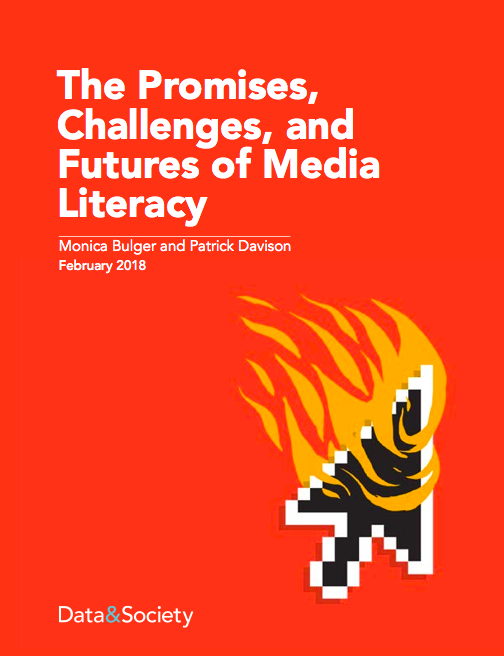The Promises, Challenges, and Futures of Media Literacy addresses the “fake news” problem by evaluating the successes and failures of recent media literacy efforts.
Contemporary media literacy programs–commonly organized around the five main themes of youth participation, teacher training and curricular resources, parental support, policy initiatives, and evidence base construction–have demonstrated positive outcomes, particularly in the case of rapid responses to breaking news events, connecting critical thinking with behavior change, and evaluating partisan content. However, media literacy efforts continue to struggle with a lack of comprehensive evaluation data, with some research showing programs can have little-to-no impact for certain materials, or even lead to harmful overconfidence in assessing media content.
Report authors Monica Bulger and Patrick Davison make five recommendations to guide the future of media literacy programming for educators, legislators, technologists, and philanthropists in the space. Specifically, they warn against the treatment of media literacy as a panacea–particularly at a time when significant resources continue to be pushed toward media literacy programs as a counter balance to “fake news.”
The report recommends the following approaches:
- Developing a coherent understanding of the media environment: With new technologies and new rhetorical techniques, existing programs should be updated.
- Improve cross-disciplinary collaboration: Media literacy is often seen as a narrow, pedagogical field. But work from other disciplines – social psychology, political science, sociology – is producing new research and findings that could greatly benefit media literacy.
- Leverage the current media crisis to consolidate stakeholders: The new attention on “fake news” could allow for new cross-disciplinary collaboration and therefore greater coherence within the field.
- Prioritize the creation of a national media literacy evidence base: A centralized and stable base of evaluation data would make more accurate assessment possible. Though there are many potential political challenges to such an evidence base.
- Develop curricula for addressing action in addition to interpretation: With the increased use of social media, literacy efforts need to be able to address user behavior in addition to interpretation.

















